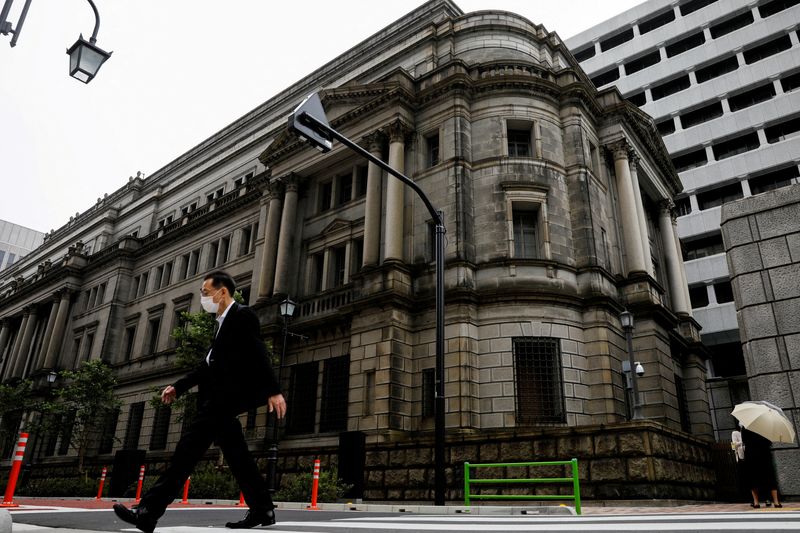By Leika Kihara and Junko Fujita
TOKYO (Reuters) - Japan's central bank on Thursday pledged to ramp up scheduled bond purchases in the second quarter, signalling it will continue to aggressively defend its yield cap against the global tide of higher interest rates.
In a closely-watched bond buying schedule for April-June, the Bank of Japan (BOJ) said it will increase purchases for government bonds across the yield curve compared with the current quarter.
The announcement came after the BOJ maintained its offer to buy unlimited amounts of 10-year Japanese government bonds (JGB) at a fixed rate of 0.25% for four straight days this week.
"We decided to increase bond purchases for a wide range of durations, from short- to super-long zones, as the yield curve remained under upward pressure," a BOJ official told Reuters.
The 10-year JGB yield fell half a basis point to 0.210%, after rising to as high as 0.225% on Thursday.
Longer-term yields retreated sharply, with those for 20-year JGBs falling 9.5 basis points to a two-year low of 0.670%. The 30-year JGB yield fell 8 basis points to 0.920%.
"The central bank boosted the amount of bonds it would buy by a large margin," said Ataru Okumura, strategist at SMBC Nikko Securities. "Its stance to defend yield curve control is clear."
Under its yield curve control (YCC) policy, the BOJ pledges to target the 10-year JGB yield around zero and sets an implicit 0.25% cap around it.
"I think JGB yields will stabilise for now. The problem is what happens to U.S. Treasury yields. If U.S. yields spike, that could put upward pressure on Japanese yields again," said Hiroshi Ugai, chief Japan economist at JPMorgan (NYSE:JPM) Securities.
With the economy still weak and inflation modest compared with Western economies, the BOJ has stressed its resolve to keep monetary policy ultra-loose even as the U.S. Federal Reserve eyes a series of rate hikes.
Prospects of widening U.S.-Japan rate differentials have pushed the yen down by around 8% against the dollar this month.
The yen's decline has exacerbated the rise in cost of fuel and raw material imports triggered by Russia's invasion of Ukraine.
Japan's top currency diplomat Masato Kanda on Tuesday hardened his language on sharp yen declines, saying Tokyo and Washington were closely communicating on currency issues.

But Rintaro Tamaki, a former top currency diplomat, said the yen's weakening was driven partly by Japan's ultra-low rates and not too far out of line with economic fundamentals.
"The yen is still moving with a range it has been boxed in since 2013, so it can't be said that (its recent declines) are a sharp deviation from fundamentals," he told Reuters.